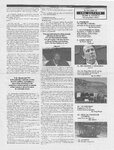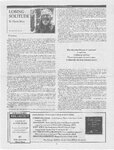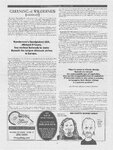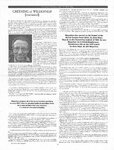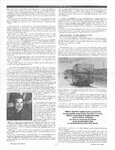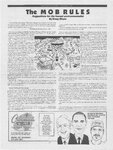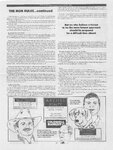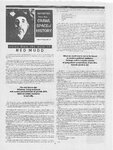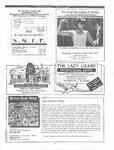| OCR Text |
Show THE ZEPHYk/AUGUST-SEPTEMBER is vehemently opposed to entering into an EU emissions trading system that would see it have to account for its sky-rocketing pollution. If anybody is talking nonsense about the environment, it is Michael O’Leary, not the UK’s Environment Minister lan Pearson who said Ryanair was not taking the issue of greenhouse gas emissions seriously. “Ryanair’s rabid boss is trying to use the same old tricks with the environment as he does with so many other issues; arrogance, bluster, diversion and misinformation. But this time it just won't wash. His lies about airline emissions being reduced as a result of new planes is utter baloney. Claims that new aircrafts have reduced CO2 emissions by 45% over the past eight years are almost entirely worthless when contrasted with an increase in passenger numbers of over 600% in the same period. Rather than decreasing, in net terms Ryanair’s greenhouse gas emissions have gone through the roof. Michael O'Leary is the fool if he expects anybody to believe that he has a Green bone in his body.” But perhaps the most reasoned assessment of Ryanair’s complicity, or lack of it, came from a web site called, lowcarbonlife.net. y (January 10th 2007) Rather than write-off Michael O'Leary as a self-serving apologist for Ryanair, environmentalists need to engage with what he says. His main points are - aviation is responsible for less than 2% of global emissions - Ryanair runs an extremely fuel efficient fleet The first point is entirely correct. However, he refers to global levels of CO2 emissions. In the UK, the figure is nearer 6%. Mr O'Leary also ignores the impact of greenhouse gases other than CO2. The science is not yet entirely robust, but it looks like we should multiply the CO2 emissions from air travel by about 3 to capture the full global warming effect of aviation. This means that about 18% of the UK’s emissions are produced by aviation. (This excludes the fuel consumption necessary to support the aviation industry, including the transport to airports and the substantial cost of actually running the ground operations). More important, the emissions from aviation are probably growing at about 4-5% a year in the UK. (Because aviation is not covered in Kyoto, statistics are little uncertain). For the UK, therefore, aviation is the single greatest source of increases in emissions. If are to stop the continu- ing rise in greenhouse gas volumes, we have to act on aviation. We need to do other things as well, but aviation must be a target. What about the ‘new, fuel-efficient’ aircraft point? The problem with Mr O'Leary’s argument is that when he buys a brand-new Airbus and trades in his old model, the older airplane still remains in the sky, and will probably still be carrying passengers in. 2025. And he exaggerates the fuel efficiency gains from new planes. Today’s models are getting 1% or so better fuel economy every year. This is nowhere near enough to compensate for the growth in travel. With the cold hard facts, lowcarbonlife.net managed to call into question most of O’Leary’s arguments. Bonderman, as chairman of the board and director of Ryanair Holdings, keeps a low profile, lets O’Leary do the talking and allows him take the heat. And in 2008, while other airlines struggle to stay alive, Ryanair managed to break even for the first half of the year. Clearly, O’Leary may not be a friend to the planet, but he has Bonderman’s unequivocal support...as long as the bottom line pleases him. And so, Ryanair continues to maintain that calls for carbon taxes are “scams” and that much of the global warming fears are nothing but “environmental hysteria.” In so doing, Mr. O'Leary sets a tone far different than the one Bonderman plays in the U.S. 2008 THE GREENING OF THE GRA$$ ROOTS While Bonderman dashes about the planet cutting deals and making money, his flamboyance may be more noteworthy than others, but he is by no means the only mega-rich contributor to this country’s mainstream environmental movement. Consider The Wilderness Society (TWS), one of the largest and most influential green groups in the U.S. Bonderman sits on TWS’s governing council with six Brenda Davis is a vice president with Johnson & Johnson. Caroline Geity Getty fortune. At $400 million, she is the 301st wealthiest American on Scott Nathan is the managing director of the other members: is an heir to the the Forbes list. Baupost Group, a Boston-based investment firm with a $4 billion portfolio. Doug Walker is the board chairman of Recreational Equipment, Inc (REI), one of the largest outdoor equipment and clothing companies in the United States, and Hansjorg Wyss is the 72nd richest person on the planet; his estimated worth is $8.7 billion. Only board member Marcia Kunstel, a former journalist and owner of a luxury dude ranch in Jackson Hole, Wyo- ming seems less than seriously rich. But she must prefer the company she keeps on TWS board —a three night visit (that’s the minimum booking allowed) at her Flat Creek Ranch costs a family of four almost $3000. How could.anyone less than a Wilderness Society board member afford to stay there? But what about the smaller, regional and local environ- mental organizations across the country? Those groups that , Operate at the grassroots? For years the grassroots greens almost took a certain pride in their poverty. It was their dediation and zeal that mattered, not their mutual funds. A few years ago, The Wilderness Society honored a man hey called “the stuff of legend.” His name is Brant Calkin, a dedicated environmentalist for almost half a century. Noting | his accomplishments, TWS's president William H. Meadows alled Calkin “fearless and outspoken.” Citing his accomplishments, Meadows noted his work at the Grand Canyon , and in the redwood forests of northern California. “But I believe his greatest achievement was in Utah,” observed Meadows. “He took a little outfit named the Southern Utah Wilderness Alliance and turned it into a powerhouse that is a model of an effective state conservation group.” But he didn’t do it with money. If anything Calkin loathed the connection between big money and good environmental work. His protege and longtime admirer, Scott Groene, wrote in praise of his boss, in this publication, in 2000: “Brant Calkin is the best damn environmentalist that ever worked on the Colorado Plateau, and he’s done more to protect southern Utah wilderness than anyone alive or dead. He created the strategy for saving the canyon country that’s been followed successfully for the past decade, set the tone for the wilderness debate, was mentor to a slew of activists, and built the Southern Utah Wilderness Alliance. And he did it witha quiet humility, integrity, and basic decency towards both his opponents and friends.” But, according to Groene, Brant Calkin was adamant about money, or the need to avoid an obsession with it at all costs. Groene wrote: “Brant offered his staff low pay but lots of autonomy to ‘do good and fight evil. The benefit of lousy pay is you get to experiment.’ Calkin offered low wages because no environmentalist should be in it for the money, and ‘pay doesn’t affect the quality of the staff.’ (photo above: Hansjorg Wyss) continues on next page... WE RENT CANOES! The people I know complain endlessly about how stupid President George W. Bush is, and how badly he has lied to the public about this or that. But a casual observer from Mars would have to conclude that President Bush perfectly represents a nation that shows such a thoroughgoing incapacity for thought, and such an aversion to the truth about its own behavior. A people so hopelessly unwilling to get its act together deserves to suffer. -James Howard Kunstler DENcia ies} gc meV rag Tu Vc eC OC olan Nancy Jacques...www.ravenseyepress.com Red p. © canoe company I.c. we're canoe-renting maniacs! 1371 North Highway 191 Moab UT 84532 Cease ee eas redrivercanoe.com 800.753.8216 435.259.7722 LOOK FOR THE A-FRAME JUST NORTH OF TOWN. |


